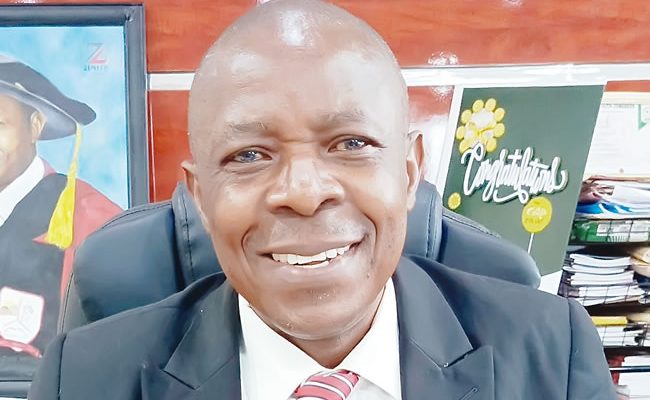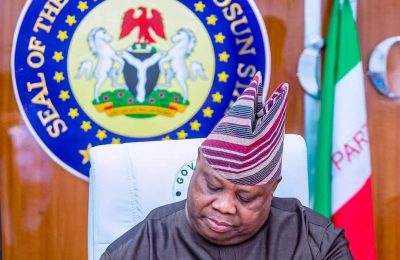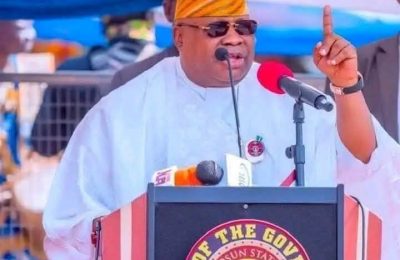

A professor of Educational Management and new Vice Chancellor of the Ekiti State University (EKSU) Ado-Ekiti, Professor Joseph Babatola Ayodele, in this interview by ‘YOMI AYELESO, speaks on his six-point agenda and strategies towards the repositioning of the state-owned institution, among other issues in the nation’s education system.
You were appointed by the state governor and visitor to the university, Biodun Oyebanji in August as the ninth substantive vice chancellor of Ekiti State University. How did you emerge as the preferred among the 18 applicants?

The process leading to my appointment was very thorough, transparent and due process was followed, in line with the laid down procedures according to the law of the university. Out of the 18 applicants who showed interest, ten of us were shortlisted and invited for an interview. After the interview process, three of us were recommended to the visitor according to the provision in the university law and the visitor has the prerogative to pick any of the three that were recommended by the governing council. That is what happened and I was picked. The chairman of council and pro-chancellor, Dr Tunji Olowolafe, a prominent businessman and philanthropist, is a man of proven integrity and he has never compromised standard and due process. He followed due process in the selection process and he does not give room for any form of intimidation. Let me say that he handled the selection process with utmost transparency within the law. The members of the council are men of integrity and they looked at all the papers and reports submitted before making their recommendations.
Looking at what you have gathered in the system over the years, what do you think are the greatest challenges confronting this university?
The major challenge has always been the funding issue which is not peculiar to our institution alone, it is a national problem. When you have more programmes, there is a need for more infrastructure, don’t forget the overhead expenses are there. There is need for funds to achieve all these but let me say that the visitor to the university and governor of Ekiti state, Biodun Abayomi Oyebanji is trying everything to ensure that we meet our financial obligations. You will recall that recently, our subvention was increased from N260 million to N450 million monthly. I have to say this that the state government for over 15 years has not done what governor Oyebanji had done to increase the subvention; it is noble and we appreciate the governor for doing it and it has encouraged us to put in more effort. However, the growth pattern of this university in terms of increasing personnel and personnel needs can never be met with what is actually on ground and not the fault of the government because we are expanding daily. The government may not be able to meet 100 percent of the running cost of a university due to the fact that the government has other sectors to look at such as agriculture, health, road infrastructure and social welfare; all these sectors are competing with meagre funds. Then, where do we go from here?
If that is the case, how do you intend to overcome some of the challenges in the university vis-à-vis the six-point strategic plan you released on the day of your inauguration ?
I presented a 21-page vision document to the selection board and the six-point agenda which I released on the day of my inauguration are germane. One of them is deepening teaching, research, creativity and innovation with a view to making the university an enviable centre of academic excellence; that is the major strategy but there are other things I want to do in that area including revamping and rebranding existing conventional programmes to be in line with 21 st century practice and to ensure their global relevance and marketability. If these programmes are more relevant and marketable globally, then we will be able to get more patronage, our IGR will expand. Also, we will look at globally relevant new programmes and we have started already with about five being approved during the last senate meeting and we will soon invite the NUC for the verification and accreditation of these programmes to increase our enrolment and as well increase in revenue. Mind you, about 80 percent of the IGR is from school fees paid by the students, and the patronage we have, the better for the university and that will reduce pressure on the government. Let me quickly say that, there is no university that depends solely on the government for funds that can survive in this present situation. There is a need for us to look inward and that is what we are doing to ensure that our programmes are more relevant. As of now, the number of professors we have in this university is not less than 200 , not to talk about readers.
What about challenges of staff unions which have been one of the issues in the university?
One of my six-point strategic plan and initiative is effective human resource management and development and I want to ensure that I create a pool of highly skilled, competent, motivated, disciplined and committed workforce. Like the issue of welfare , my plan has to do with mainstreaming quality staff and students’ welfare because when workers’ welfare is taken care of , they will be motivated and committed. I have strategies to deploy in ensuring that their welfare and skills are improved upon. We will ensure that there is prompt payment of salaries and other emoluments, and ensure that their career path is very smooth. We have adopted a strategy that I am going to set up an industrial relation committee; the idea is to deviate from the practice from waiting for a time of crisis to have discussion. I want to have a proactive dialogue and the management has approved the committee which has veteran members of staff and labour leaders of the four major unions (ASUU, SSANU,NAAT,NASU) . They will be meeting regularly with unions to know their challenges and how it could be resolved. By the time we do this, there will be no need for any dispute or industrial crisis because we might have solved problems before they even arise. I want to say that our union leaders in EKSU are progressives, they have ensured stability in the last two or three sessions because the university has done its part. On the issue of the minimum wage, I want to say that we have received the papers , and started the process to council for implementation. Even the wage award was implemented here without even waiting for agitation from the workers. So, we are duty bound to take care of our staff and don’t forget that their children of members of staff here attend the same school with others, they go to the same market with others. If the government says we must implement it, we must do it. The papers will be processed and the members of staff will get what is due for them without any agitation from staff unions.
You will be here for the next five years as the VC, where do you intend to see this university after your tenure?
After five years, I want to see EKSU as one of the best three universities in Nigeria, I don’t want to be too over-ambitious. Also, I want to see EKSU as the best state owned university in the country and see our graduates doing very well across the world. Let me tell you that we have started within the last forty days including the excellent results recorded by our students in the Nursing professional examination, 49 students did well. As a result of that, the Nursing and Midwifery Council approves our university as a centre. In our international college, one of our SS2 came first out of over 500 students in the 2024 edition of an annual essay competition by the National Electricity Regulation Commission. Our students from the Engineering faculty, two of them produced electric walking sticks and came second nationally in the competition, this is just under forty days.
No doubt, there are challenges in the nation’s education sector. As a stakeholder, how do you think we can overcome some of these challenges towards the development of the country?
Any nation that does not place a premium on the education of its citizens, will go into extinction. Resources are resources when they are explored and utilized for the welfare of the citizens. Who explore resources, they are human beings and that is what education does. Education is the hub of development, education is the lubricant to any development process. Education opens people’s minds to freedom; human capacity building is key to national development. If you look at the developed countries, they don’t joke with the education of their citizens. I want to commend the federal government for the Nigeria Education Loan fund for the students, there is poverty in the land and we have a lot of people who are brilliant and want to go to school but could not due to lack of money but this initiative will address that situation. If this can be sustained, it will help indigent students to go to higher institutions. Government should ensure that local governments release about five percent for education development because if they are able to do this, it will help to develop the grassroots. Besides, the policies of the government should be friendly so as not to discourage people from going to school. There is a need for the government to ensure that the investment environment is conducive so that people can come from abroad, they will be able to absorb our graduates , which will in turn encourage people to go to school. But now that the capacity of the economy is shrinking daily and institutions are churning out graduates, this might discourage people from having interest in education and that is why you see a lot of our young ones going into internet fraud and the likes. During my inaugural lecture, I said one of the basic ingredients that can solve the problem of insecurity in this country is to train people, and they will do things that will lead to development of the nation. The government should do more to make the policies enduring and not allow policy summersault; they should allow education policies to mature before any change. Let me also say that the allocation to the education sector is too small, don’t forget UNESCO recommended 26 percent to the education sector but over the years, I don’t think there has been any government that has allocated more than 10 percent to education. That is why there are issues here and there and I hope the government will be able to sit down and address them headlong.
READ ALSO: Police confirm Oloba Salo hospitalised after gun attack in Lagos








